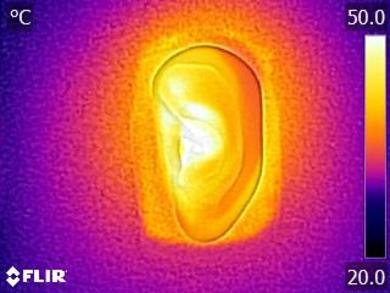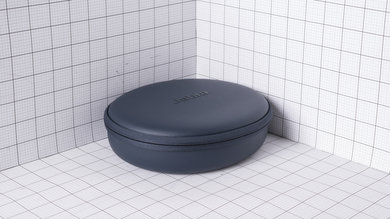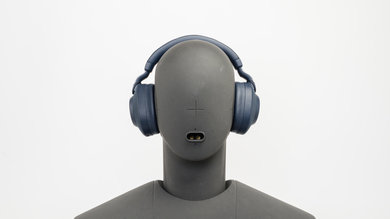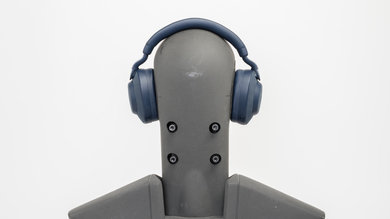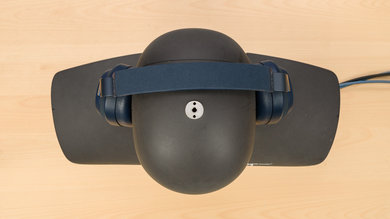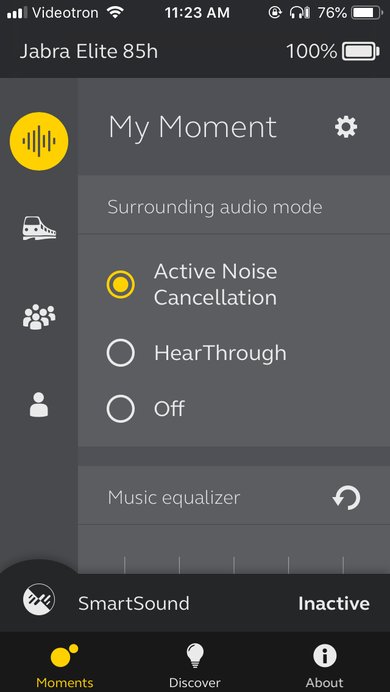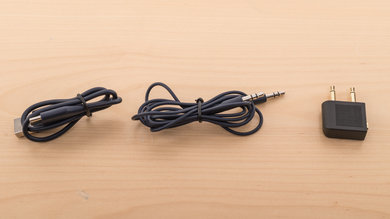The Jabra Elite 85h Wireless are versatile noise cancelling headphones that can be used in a wide variety of daily uses. They have great audio reproduction and will be good for a variety of music genres. Their active noise cancelling (ANC) feature is decent and blocks ambient noise well, but it’s not quite on par with that of similar high-end ANC headphones. On the upside, they have a very comfortable fit and their microphone sounds better than most Bluetooth headphones. They have amazing battery life and their wireless range maxed out our testing facility. Overall, these headphones offer great value and should satisfy most users.
Our Verdict
The Jabra Elite 85h are good for neutral listening. They have a deep and punchy bass, but it's slightly thumpy, which some may prefer. Their mid-range is nearly flawless and vocals and lead instruments will be accurately reproduced. The treble range is also very good, but it might lack a bit of detail and brightness on vocals and leads, and on some sibilants (S and T sounds). Overall, these headphones have a good audio reproduction that will be suitable for a wide variety of music genres.
-
Great audio reproduction.
-
Very comfortable fit.
-
Great battery life.
-
Exceptional wireless range.
-
ANC isn't on par with other similar high-end headphones.
-
Sound delivery inconsistencies, especially in the treble range.
The Jabra Elite 85h are decent for commuting. Their isolation is pretty good, but they don’t particularly do well against lower-end noise like the deep rumble of bus and planes engines. On the upside, they're comfortable to wear for long rides and flights, and their battery life is amazing and will last you the longest trips. They also don’t leak too much, so you might be able to block more ambient noise by raising your listening volume without bothering people surrounding you.
-
Great audio reproduction.
-
Very comfortable fit.
-
Great battery life.
-
Exceptional wireless range.
-
ANC isn't on par with other similar high-end headphones.
-
Sound delivery inconsistencies, especially in the treble range.
The Jabra Elite 85h are passable for sports. While they're fairly stable, these headphones aren’t designed for this use. They trap heat inside their cups, which will make you sweat noticeably more than usual. Also, their bulky design isn’t ideal for exercising. They aren’t the most portable headphones, but thankfully, their over-ear design is foldable, and the cups lay flat to fit inside their case.
-
Great audio reproduction.
-
Very comfortable fit.
-
Great battery life.
-
Exceptional wireless range.
-
ANC isn't on par with other similar high-end headphones.
-
Sound delivery inconsistencies, especially in the treble range.
The Jabra Elite 85h are good for the office. These headphones’ ANC feature blocks a good amount of work environment noise. Their battery life is also amazing and will last you a few workdays without needing to recharge, which is great. Also, the headband and cups are comfortable enough to wear for a few hours without feeling too much fatigue. They can also connect to two devices simultaneously, which is convenient if you often switch between your phone and computer.
-
Great audio reproduction.
-
Very comfortable fit.
-
Great battery life.
-
Exceptional wireless range.
-
ANC isn't on par with other similar high-end headphones.
-
Sound delivery inconsistencies, especially in the treble range.
The Jabra Elite 85h are sub-par for gaming. These headphones’ microphone has better recording quality than most Bluetooth headsets, but it still won’t be comparable to a good gaming headset’s boom microphone. Their latency, when used wirelessly, is also too high for video games, and you’ll notice a pretty significant delay. However, if you don’t need a microphone and don’t mind playing with wired headphones, their sound quality is pretty good and they're quite comfortable to wear for long gaming sessions.
-
Great audio reproduction.
-
Very comfortable fit.
-
Great battery life.
-
Exceptional wireless range.
-
ANC isn't on par with other similar high-end headphones.
-
Sound delivery inconsistencies, especially in the treble range.
-
Great audio reproduction.
-
Very comfortable fit.
-
Great battery life.
-
Exceptional wireless range.
-
ANC isn't on par with other similar high-end headphones.
-
Sound delivery inconsistencies, especially in the treble range.
- 7.9 Neutral Sound
- 7.3 Commute/Travel
- 7.2 Sports/Fitness
- 7.6 Office
- 6.2 Wireless Gaming
- 7.8 Wired Gaming
- 7.3 Phone Calls
Changelog
- Updated Aug 30, 2023: Compared their Bluetooth features with the Beats Studio Pro Wireless'.
- Updated Aug 16, 2021: Converted to Test Bench 1.5.
- Updated Aug 24, 2020: Validated our results.
- Updated Feb 06, 2020: Converted to Test Bench 1.4.
- Updated Nov 21, 2019: Converted to Test Bench 1.3.1.
Check Price
Compared To Other Headphones
The Jabra Elite 85h are good, stylish, mixed usage headphones that set themselves apart by their great audio reproduction, decent ANC feature, and a noticeably better microphone than most Bluetooth headphones. Unfortunately, their ANC isn’t on par with some other high-end competing models.
See our recommendations for the best noise cancelling headphones and the best wireless headphones.
The Sony WH-1000XM4 Wireless are better than the Jabra Elite 85h Wireless. The Sony have much better build quality, and their ANC feature blocks out much more ambient sound. That said, the Jabra's integrated microphone has a much better recording quality, and the Jabra's onboard controls include a mute microphone button.
The Jabra Evolve2 85 Wireless and Jabra Elite 85h Wireless are very evenly matched over-ear headphones. The Evolve2 85 are meant for professional users, block out more ambient noise, have a better-performing microphone, and charge slightly faster. The Elite 85h are designed for more casual use and have a more neutral sound profile out-of-the-box. They also last longer on a single charge.
Both the Jabra Elite 85h Wireless and Sony WH-1000XM3 Wireless are very versatile ANC headphones. The Jabra have a better control scheme with physical controls, and their default sound profile is more accurate and better sounding. However, they don’t have the great noise isolation performance of the Sonys. Since you can easily EQ the XM3 in their app, they could be the best option for most. On the other hand, the mic of the Jabra is superior and sounds clearer and fuller, which is better for calls.
The Bose QuietComfort 35 II/QC35 II Wireless 2018 are better mixed usage headphones than the Jabra Elite 85h Wireless due to their amazing noise cancelling performance. The Bose are better-suited to commuting as they block out more low-end noises like engine rumbles. On the other hand, the Jabra feel slightly better built than the Bose, and their control scheme is more complete. They also have noticeably better wireless range and aren’t as leaky as the Bose.
The Jabra Elite 85h Wireless and the JBL CLUB 950NC Wireless are both decent Bluetooth over-ears that perform similarly for certain uses. The Jabra are more comfortable and have a better control scheme, as well as a significantly better-sounding integrated microphone. They also have a longer battery, and a slightly better-balanced default sound profile, though both are quite well-balanced out-of-the-box. On the other hand, while the Jabra have a graphic EQ in their companion app, the JBL's EQ is fully parametric, allowing you to finetune their sound profile more precisely.
The Jabra Elite 85h Wireless are more versatile than the Bang & Olufsen Beoplay H9i Wireless. Their control scheme is great, complete, and easy to use, and their default sound quality is noticeably better than the Bang & Olufsen. Additionally, they have better wireless range and their app offers more customization options. On the other hand, the Bang & Olufsen are better-built, and look and feel like more premium headphones. You’ll get noticeably more battery life on the Jabra and their microphone recording quality will sound fuller and more clear.
The Jabra Elite 85h are slightly better headphones than the Sennheiser PXC 550 Wireless. They feel a bit more comfortable and their physical button control scheme is easier to use than the touch-sensitive surface of the Sennheiser. Both have similar sound quality, but the Jabra have more bass. The isolation performance of the Jabra is also slightly better, which will be good for commuting. On the other hand, the Sennheiser's EQ is better and offers better customization.
The Bose 700 Headphones and the Jabra Elite 85h Wireless are both decent noise cancelling headphones that are good for business users thanks to their improved Bluetooth microphone performance. The Bose mic performs even better than that of the Jabra, though, with even better noise handling. However, their touch-sensitive control scheme can be a bit tricky to use at times, so some people may prefer the physical controls of the Jabra. The Jabra also have a more balanced sound profile and better battery life than the Bose, but they don’t isolate noise as well. Both headsets have a unique design, so ultimately the difference lies in personal taste.
The Jabra Elite 85h Wireless are slightly better headphones than the Beats Solo Pro Wireless. The Jabra are more comfortable, have a more neutral default sound profile, which some users may prefer, and better overall mic performance. Their battery performance is better, and their companion app offers a graphic EQ and presets to help you adjust their sound to your liking. However, the Beats are better-built, and their ANC system does a significantly better job of blocking out noise around you.
The Jabra Elite 85h Wireless and the JBL CLUB ONE Wireless are very similarly performing headphones. The Jabra are slightly more comfortable, they have easier-to-use controls, and their sound profile is more neutral as well as better-balanced. They also have a better overall performing microphone, their continuous battery life lasts much longer, and their active noise cancelling does a slightly better job overall. On the other hand, when used wired, the JBL have full compatibility with PC, PS4, and Xbox One. They also come with a coiled cable for DJing, their companion app has a parametric EQ, and they feel better built than the Jabra.
The Razer Opus Wireless 2020 are better over-ear headphones than the Jabra Elite 85h Wireless. Both headphones have a well-balanced sound profile, but the Razer are more stable on the head and look and feel more durable. They also have a significantly better ANC feature and are fully compatible with both PS4 and Xbox One when used wired. On the other hand, the Jabra have a better microphone, have a slightly longer battery life, support multi-device pairing, and have a better companion app with more customization options.
The Jabra Elite 85h Wireless are better overall performing over-ear headphones than the Sennheiser HD 450BT Wireless. The Jabra are more comfortable, have a significantly better control system, and their sound profile is more balanced and neutral. They also have a much better sounding microphone, their battery lasts longer, and they have a more comprehensive app. However, the Sennheiser are more stable, leak less noise, and their ANC performs a bit better in the bass range.
The Jabra Elite 85h Wireless are better over-ear headphones than the Anker Soundcore Life Q35 Wireless. The Jabra are more comfortable and have a more neutral sound profile that some users may prefer. However, the Anker have a better ANC and overall mic performance.
The Jabra Elite 85h Wireless and the Wyze Buds Pro Truly Wireless have different strengths, and you may prefer one over the other. The Jabra are over-ear headphones that are more comfortable, have a better overall microphone performance, and have longer continuous battery life. They also have a more robust companion app with a graphic EQ and presets to help you adjust their sound, and they support multi-device pairing. In comparison, the Wyze are in-ears that are more portable and lightweight. They also have a more stable fit and have a better noise isolation performance.
Test Results
The Jabra Elite 85h are sleek-looking over-ear headphones. Their band design is a bit unconventional and their build is covered by a fabric coating. The cups are large and well-padded. These headphones come in a monochrome color scheme but have different designs such as black, titanium black, navy, and gold beige, which stand out a bit more.
These headphones are very comfortable. The cups are fairly wide and deep, and should fit most ears. The padding is thick and soft, and the headband distributes the headphones’ weight effectively. They could be slightly tight for people with larger heads, as their headband doesn’t expand that much. The headphones feel fairly lightweight once on your head and can be worn for long periods of time before feeling any fatigue.
The Jabra Elite 85h have a great control scheme that is easy to use. You get common functionalities like call/music management, track skipping, and volume controls. You can easily mute your microphone with the dedicated button and cycle through ANC on, off, and the talk-through mode. The mic-mute button also doubles as a trigger for your device’s voice assistant for voice-enabled commands and you can cycle through your Sound Moments, which are basically presets for different uses, by holding the ANC button down. You can also hear the battery level by holding the volume up and down buttons when you’re not listening to music or on a call.
These headphones also have a smart pause feature that automatically plays/pauses your music when you put the headphones on/take them off your head. To turn off the headset, simply swivel the cups to lay them flat, similar to the Sennheiser PXC 550 Wireless.
Like most closed-back over-ears such as the Anker Soundcore Life Q35 Wireless, the Jabra Elite 85h trap heat inside their cups. This shouldn’t be too much of an issue for casual listening, but they won’t be ideal for physical activity as you could experience more sweating than usual.
Like most over-ears, the Jabra Elite 85h aren't very portable. They're quite bulky, but thankfully you can fold them in a more compact format. Their cups also swivel to lay flat, which also turns off the headphones when you don't need to use them. When the cups are folded in and flat, you can easily store them inside their great hard case.
The Jabra Elite 85h’s case is great and protects the headphones well against physical damage from falls, scratches, and minor water exposure. The case doesn’t add too much bulk to their design and is quite similar to that of the Bose QuietComfort 35 II/QC35 II Wireless 2018 and the Sony WH-1000XM3 Wireless.
The Jabra Elite 85h are well-built headphones with dense cups that should survive a few accidental drops without too much damage. The overall build feels fairly sturdy, but the hinges are weirdly designed with a small metal piece to cover the cable going to the headphones. However, it's fairly thin and feels a bit fragile when folding the cups in, which could be the potential weak point of the build. These headphones aren't quite on par with high-end headphones like the Sony WH-1000XM3 Wireless or the Bang & Olufsen Beoplay H9i Wireless.
These headphones are fairly stable, but the ear cups sway around a bit with heavy head movement. They won’t be ideal for sports, but you could use them for a light jog, even if they weren’t designed for this use. On the upside, their wireless design means there won’t be a cable to get stuck on something and yank the headphones off your head.
The Jabra Elite 85h have a mediocre frequency response consistency performance. These headphones are prone to consistency issues throughout the range, especially in the treble range. They have decent consistency in the bass range, but the maximum variance measured across our five human subjects is about 8dB at 20Hz, which is noticeable. We noticed that certain types of glasses could break the seal on these headphones and cause a drop in bass. In the treble range, the maximum amount of deviation below 10kHz is over 13dB, indicating that these headphones' treble delivery is very sensitive to positioning. If you want a similarly-performing pair of headphones that are more consistent among users, check out the JBL CLUB 950NC Wireless.
The Jabra Elite 85h have excellent bass. Their low-frequency extension (LFE) is at 10Hz, which is very good. Low-bass is overemphasized by about 3dB, which results in a bit of excess thump and rumble, common to bass-heavy genres like EDM and dubstep. The rest of the response is nearly flawless and very accurate to our target curve. This means that the overall bass will be powerful, punchy, and deep, but slightly thumpy.
Also, their bass delivery varies across users, and seems to be sensitive to the quality of fit, seal, and whether you wear glasses. The response here represents the average bass response, and your experience may vary.
The mid-range performance of the Jabra Elite 85h is excellent. The response is, throughout the range, even and flat and within 1.5dB of our target, which is great. This results in an accurate reproduction of vocals and lead instruments.
The Jabra Elite 85h have very good treble performance as well. The response throughout the range is fairly flat and well-balanced, but slightly underemphasized. The 2dB dip in low-treble will negatively affect the detail and brightness of vocals and leads while the deep dip around 8kHz will negatively affect sibilants (S and T sounds).
However, their treble delivery varies noticeably across users. The response here represents the average response and your experience may vary.
The imaging of the Jabra Elite 85h is great. Weighted group delay is at 0.22, which is very good. The GD graph also shows that their entire group delay response is within the audibility threshold. This ensures a tight bass and a transparent treble reproduction. Additionally, the L/R drivers of our test unit were well-matched in amplitude, frequency, and phase. This is important for the accurate placement and localization of objects (voices, instruments, video game effects) in the stereo field. However, these results are only valid for our unit and yours may perform differently.
The Jabra Elite 85h have a poor soundstage. The PRTF graph shows a poor amount of pinna activation and it isn’t accurate. Also, the notch near 10kHz isn’t deep enough. This and their closed-back design suggest a soundstage that is relatively small, unnatural, and likely to be perceived to be located inside the listener's head, as opposed to in front.
Update 05/17/2019: We've updated the Jabra Elite 85h software and this resulted in worse noise isolation performance. We've updated the review accordingly.
The Jabra Elite 85h have mediocre noise isolation and it isn't as good as that of competing models like the Sony WH-1000XM3 Wireless or the Microsoft Surface Wireless Headphones. The active noise cancellation achieves 2dB of isolation in the bass range, which means they're not the best at cancelling out airplane and bus engine rumbles. However, they achieve 20dB and 35dB of isolation in the mid and treble ranges respectively, both values being good. This indicates good isolation performance for speech and sharp sounds such as S and Ts and fan noises like A/C systems.
The leakage performance is good. The significant portion of leakage sits between 500Hz and 1kHz, which is a narrow range. The leakage will sound fuller and more comprehensible than the leakage of in-ears and earbuds, but not as much as open-back headphones. However, the overall level of leakage is not too loud. With the music at 100dB SPL, the leakage at 1 foot away averages at 34dB SPL and peaks at 52dB SPL, which is around the noise floor of most offices.
The recording quality of the mic is decent. LFE (low-frequency extension) is at 369Hz which means speech recorded or transmitted with this microphone will sound relatively thin. The HFE (high-frequency extension) of 6.7kHz results in a speech that is clear and detailed but lacks a bit of airiness. However, speech will still be easily understandable, since speech intelligibility is mostly dependent on the 500Hz-4kHz range. If you're looking for a pair of similarly-performing headphones with superior mic recording quality, take a look at the Jabra Evolve2 85 Wireless, which have a boom microphone.
The integrated mic has acceptable noise handling. In our SpNR test, it achieved a speech-to-noise ratio of 20dB, indicating the mic is best suited for quiet environments and will struggle to separate speech from ambient noise in loud situations.
Update 02/14/2020: Due to an issue with the way we tested passive playback on headphones with no dedicated power button, these headphones were incorrectly listed as having passive playback when they don't. This review has been updated to reflect these changes.
The Jabra Elite 85h have a great battery life. They offer over 30 hours of continuous playback for only about 2.5 hours of charge time. They also enter a standby mode after a set time, which you can modify inside their app to save power. You can use them while they're charging if the battery is dead, which is convenient. You should be able to use these headphones for a few consecutive days without having to charge them. Jabra advertises over 40 hours of battery life with the ANC turned off, and you can get five hours with only 15 minutes of charging.
The Jabra Sound+ app is great and offers many options with the Jabra Elite 85h. You get a good 5-band EQ, control over ANC, and talk-through. You can set the power-saving timer. Jabra also has what they call Moments, which are basically different presets for certain situations like your commute, a public street, or when you’re alone. Inside each preset, you can set your ANC or talk-through, and you can EQ the headphones as well. This acts like different profiles for your different daily situations. Jabra also implemented SmartSound, which listens to your surrounding noise and applies the appropriate Moment preset, and all your set settings for that specific Moment automatically.
The Jabra Elite 85h are Bluetooth headphones that can be simultaneously connected to two devices at the same time, which is useful if you often switch between your office computer and phone. Unfortunately, they don't support NFC for quicker and easier pairing. If you want an easier way to pair your headphones and your phone, you might want to check out the Beats Studio Pro Wireless, which have features for quick pairing with iOS and Android phones. That said, you can hold the Jabra's middle multipurpose button to easily put them in pairing mode.
They have a bit more latency than most Bluetooth headphones, but some may still not notice a delay in their daily usage. Some apps and devices offer some sort of compensation, so you might not notice as much when watching video content. However, it will more than likely be too high for gaming. On the upside, you can use them wired with the included audio cable to nullify the latency issues.
The Jabra Elite 85h come with a 1/8” TRS cable that doesn’t have an in-line microphone. This means you’ll only have audio when you use them wired with any platform that has the appropriate audio jack.
As these headphones use a detachable TRS cable, they can only receive audio when plugged into your Xbox One controller.
Comments
Jabra Elite 85h Wireless: Main Discussion
Let us know why you want us to review the product here, or encourage others to vote for this product.
Update: Replaced the Apple MacBook Air 13 (2024) with the Apple MacBook Air 13 (M4, 2025) because the M3 MacBook Air was discontinued. Removed the Apple MacBook Air 13 (2022) from the Notable Mentions because it’s no longer available.
What do you think of these changes? Let us know





